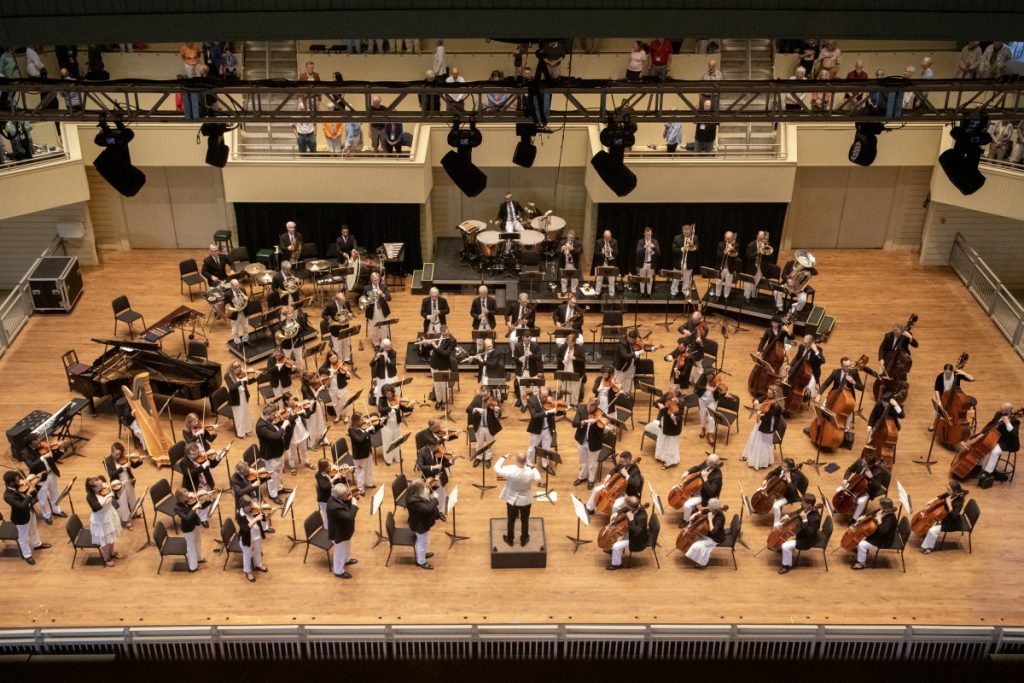
Sarah Russo
Staff Writer
During the early 20th century, the influence of African American culture and jazz grabbed the attention of composers such as Maurice Ravel and George Gershwin.
“The world had never seen such a broad range of musical styles as what emerged at this time,” said Timothy Muffitt, artistic director of the School of Music and conductor of the Music School Festival Orchestra.“I enjoy concerts that highlight that feature, that do a little bit of a time capsule look at the early 20th century.”
Muffit will help highlight this transformative time, leading the Chautauqua Symphony Orchestra in its performance of pieces by Florence Price and Igor Stravinsky at 8:15 p.m. tonight in the Amphitheater.
“It’s about the broad range of musical styles,” Muffitt said. “(These are) just two dots on the plot of many others. I think this is just an interesting program in that it takes a look at a couple of very influential elements of the evolution of music in the first half of the 20th century.”
The program will open with Price’s Symphony No. 1 in E minor, premiered by the Chicago Symphony in 1933, making it the first symphony composed by a Black woman to be performed by a major American orchestra.
For decades, it was nearly impossible to hear a piece of price’s music. Despite her immense talent and drive, many classical music performers and gatekeepers put her aside, and her work failed to gain traction with the large, almost exclusively white institutions that had the power to catapult her to the mainstream.
As Price herself wrote in a letter to famed conductor Serge Koussevitzky, “I have two handicaps — those of sex and race.”
“Certainly Florence Price was a pioneer, to put it mildly, and she was an inspired musician — an inspired, prolific composer,” Muffitt said. “Naturally, she had a hard time getting her music played. People wouldn’t look at it, they wouldn’t even consider it, but she’s a composer of just extraordinary historical significance.”
As an African American female composer of the 20th century, Price comes from a different background than her fellow composers of the time period. She uses her own individual perspective, while integrating a well-known and well-established musical vocabulary.
“I think that’s where a lot of the interest in her music lies,” Muffitt said. “It’s not like she’s inventing a whole new musical language. She’s using a language that’s already established. How that comes through in her music, … she’s speaking a language we recognize, but it has an inflection and a spirit that is fresh still today, even though this piece is almost 100 years old.”
Born in Little Rock, Arkansas in 1887, Price wrote four symphonies: Symphony No. 1 in E minor won first prize in the Rodman Wanamaker Competition in 1932; Symphony No. 2 in G minor is presumed lost; Symphony No. 3 in C minor; and Symphony No. 4 in D minor.
Fortunately, in recent years, there has been renewed interest in her work. A recording of her symphonies performed by the Philadelphia Orchestra was nominated for a Grammy in 2022. Her music has been performed by the San Francisco Symphony, the Atlanta Symphony Orchestra, the Chicago Symphony Orchestra and now the Chautauqua Symphony Orchestra.
“We definitely hear her heritage in the music,” Muffitt said. “Her heritage is very much at the forefront of the music, but that isn’t what it’s all about either. I thought (Symphony No. 1) was the one that would have the most immediate impact on (Chautauqua) who perhaps aren’t familiar with her works.”
The program concludes with Stravinsky’s Firebird Suite. Stravinsky, born in Oranienbaum, Russia in 1882, has become an influential and well-known composer of classical music.
Muffitt said the influence of a “masterpiece” like Stravistky’s Firebird means that no matter how many times musicians perform it, they relish the experience.
“It’s a work that we as professional musicians have performed probably countless times in our careers and it never gets old,” he said. “I’m excited to be sharing this music with Florence Price. She has had quite a renaissance and much deserved.”
Even with such differing backgrounds, pairing pieces from a white Russian man and a Black American woman works for many reasons, Muffitt said.
“They were both pioneers in their own way,” he said. “Stravinsky invented a new musical language. … Price is using a language that’s already established, but she’s coming from a completely unique perspective as an artist.”




